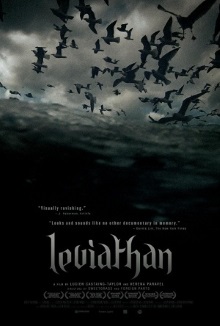
Though billed as a documentary, Leviathan is really a work of pure visual artistry. Made by Lucien Castaing-Taylor and Véréna Paravel who are both anthropologists at Harvard University, it is best described as an attempt to capture what it feels like to be aboard a commercial fishing trawler as it works the seas around North America. With no narration and no dialogue beyond the rare incidental remark by the crew which are almost always completely unintelligible, it is up to the audience to glean whatever meaning that they can from the myriad images and sounds.
This is easier said than done as the camera resolutely eschews even simple exposition. It lingers for long moments on strange shapes and colors moving in the dark until the eye finally perceives that they are the hands of fishermen working ropes. Suddenly what looks like an image of a seagull momentarily enters the frame but at an impossible orientation. In another scene, the camera inverts itself and dips in and out of the ocean so frequently that you can barely tell whether you’re looking at the sea or at the sky.
All this makes Leviathan a struggle at times to get through but your patience is rewarded by images the likes of which you’ve probably never seen anywhere else. Some of this takes the form of pure visual thrill, such as when the sky is filled with seagulls packed so close you feel certain that they must hit one another and the camera switches between filming them upside down and the right side up so seamlessly that it makes no difference at all which is which. Then there are the images which hit you with an emotional punch. After the fishermen gut their catch, the deck of the ship is covered with viscera and blood. When they wash down the deck, a continuous flow of bloodied water gushes from the ship into the ocean. After a while you keep expecting the flow to stop, surely that’s enough blood, but it goes on and on and on.
On an intellectual level, you probably won’t learn much about the North American fishing industry after watching this documentary. But on a gut level it succeeds brilliantly, so much so that my wife felt nauseous while watching it. It’s inventive, it captures the quiet moments as perfectly as the sublime ones and surprisingly for a film which is so full of scenes in which nothing much happens, feels experientially dense. The only complaint I have is the odd choice of a fancy font that makes all text in the film very difficult to read. It probably won’t be the best thing you watch this year and it’s all but certain to be the most unique one.
One thought on “Leviathan (2012)”